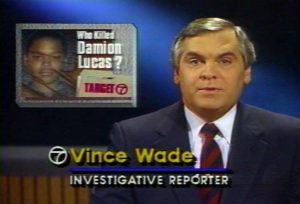“How did you decide to write this book?” It’s a question I hear often. The answer is a story of its own.
I was a television news investigative reporter in Detroit during the years (the 1980s) Richard ‘White Boy Rick’ Wershe was working secretly for the FBI in the War on Drugs. I knew about him as one of the characters in the dope trade, but not about his role as a paid informant.
During this era, public corruption was rampant in Detroit and the police department was not immune. It was one of my priorities as an investigative reporter.
I heard about an unsolved homicide involving a 13-year old boy that appeared to have been deliberately mishandled by the police in order to protect a politically-connected drug gang. I spent the better part of 1988 investigating the murder of young Damion Lucas. The police investigation was a can of public corruption worms.

FBI agents working to prosecute the Johnny Curry drug gang learned from wiretaps and the informant work of Rick Wershe that police corruption was involved and that an innocent man was being railroaded in the homicide investigation.
Police Stonewalling
The federal agents went up the chain of command in the Detroit Police Department, trying to get an honest investigation of the Damion Lucas homicide. They were stonewalled. Drug dealer Johnny Curry was married to Cathy Volsan, the niece of Detroit Mayor Coleman Young. In Detroit, Young was more like an emperor than a mayor and the police had learned the hard way that Young’s family was above the law and not to be linked to any criminal investigations. Careers were ruined for those who didn’t follow this unwritten rule. Thus, the Detroit Police Department went out of its way to avoid investigating information that the Johnny Curry gang was responsible for the inadvertent killing of 13-year old Damion Lucas.
An FBI agent, Herman Groman, almost went to jail for intervening in the murder case against LeKeas Davis, the innocent man who was being framed by the Detroit Police. Groman told the defense the FBI had wiretaps and snitch information that Davis was innocent. But Groman refused to reveal his confidential informant. The trial judge threatened to send Groman to jail if he didn’t divulge his informant’s name. The issue went to the very top of the U.S. Justice Department.
The crisis was defused by allowing local prosecutors to interview the informant—White Boy Rick Wershe—by telephone from the FBI office to ensure the call wasn’t taped. The charges against Davis were dropped but the Damion Lucas homicide went unsolved.

I reported this story in November, 1988 a five-part series of special reports on WXYZ-TV, Channel 7, the ABC affiliate in Detroit. My reports caused a stir, but nothing changed in the homicide investigation.
A Life Sentence After Helping the War on Drugs
Earlier that year, Rick Wershe was sentenced to life in prison in a drug case. The FBI had dropped him as an informant as a result of the showdown in court over keeping his identity secret. White Boy Rick had been recruited at age 14 by the FBI and the dope trade was the only trade he knew. It was a business skill he learned from the narcs. When the FBI dropped him, he foolishly decided to try his hand at becoming a cocaine wholesaler. He was soon caught, tried and convicted.
A Call for Help
Fast forward to the early summer of 2014. One day, I received a phone call from Gregg Schwarz, a retired FBI agent who had worked narcotics in Detroit. I hadn’t spoken to him in years.

Schwarz explained he was trying to help White Boy Rick Wershe get out of prison. He had stayed in touch with Wershe every week for years, acting as his mentor, surrogate father and reliable friend. Schwarz felt the federal government had used this teenager, who did an excellent job for them, then kicked him to the curb when things got hot. Schwarz felt it was an injustice and he was on a crusade to correct a wrong. He was looking for a video of the series of reports I had done on the killing of Damion Lucas.
We had several long phone conversations. The more we talked, the more I was hooked on this story. I decided to help. I made contact with Rick Wershe. He welcomed the help. I started a blog. My initial idea was to write about police informants in general, but it soon became a blog totally about White Boy Rick.
I was able to show through documents—and the lack of documents—requested through the Freedom of Information Act, that there was strong reason to suspect Rick Wershe was being kept in prison and denied parole because he had told on the wrong people. People with powerful political connections in Detroit.
A Book Evolves, and a Movie, Too
Eventually I decided to write a book about what I had found. It was evident the Rick Wershe story was an amazing tale from the nation’s endless failures in the War on Drugs. The White Boy Rick story was and is emblematic of all that is wrong with the effort to stop the use of illegal drugs through more and harsher law enforcement. It has failed just as Prohibition failed decades ago.
Research showed me there is a need for a book that explores the failed War on Drugs from the street-level. I decided to use White Boy Rick as the anchor, the “soldier” who helps the reader understand the futility of this so-called war.
Rick Wershe has spent his entire adult life in prison, even though he was never charged with a violent crime or ordering one. Wershe’s attorney, Ralph Musilli, persisted over several years in demanding that state officials come to court and show why they were denying parole to White Boy Rick. A federal judge in Detroit eventually agreed the State of Michigan should be compelled to come to court and explain the treatment of Rick Wershe. A parole hearing was quickly scheduled, and in the summer of 2017, White Boy Rick Wershe was granted parole.
Alas, he had a separate auto theft fraud conviction in Florida, so he went from prison in Michigan to prison in the Sunshine State.
His story is so bizarre that Hollywood became interested and produced a movie, starring Matthew McConaughey as Rick’s father. The film will be released in August, 2018.
Rick Released from One Prison, Goes to Another
Media coverage of Rick Wershe, Jr. helped keep him in prison for nearly 30 years, but media interest, including my blog, Informant America, kept pressure on the criminal justice system, too. The media interest helped the relentless court efforts by Ralph Musilli, Wershe’s attorney, to win a parole hearing. When a Detroit federal judge agreed with Musilli that the State of Michigan should explain in court why it was keeping Wershe in prison when murderers and rapists had been released, the tide turned and Wershe won a parole hearing and ultimately, parole.
But his ordeal wasn’t over yet. He was transferred from a Michigan prison to a Florida prison to serve a shorter sentence for a conviction for his participation in an auto fraud and theft case.
He is in a minimum custody prison and he is due for release in February, 2021.
